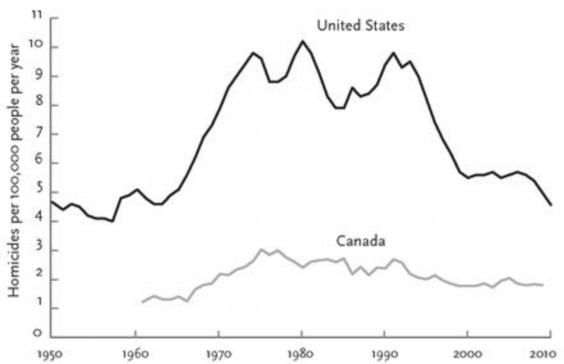With the recent shooting in Orlando, gun control is once again a hot topic. We’ve discussed gun control here at Difficult Run a number of times. As a non-gun owner, I’ve never taken too much interest in the debate. There have been some major literature reviews (including two by the National Academy of Sciences, one by the CDC, and one by the Department of Justice) on the effects of gun control over the years, all of which found no conclusive evidence that gun control laws reduce gun violence. Yet, other studies have found that regulation can indeed help curb gun violence. And then there are larger trends to consider. As noted by NYT columnist Nicholas Kristof in a previous post, “The number of guns in America has increased by more than 50 percent since 1993, and in that same period the gun homicide rate in the United States has dropped by half.” In fact, according to the FBI and Bureau of Justice statistics, homicide rates are the lowest they’ve been since 1958.

But as The Economist notes,
Pro-gun groups point out that rates of gun ownership tend to be highest in rural, sparsely populated states, where crime rates are low. By the same token, over the past two decades, as the number of guns in America has risen sharply, crime rates have fallen. Yet even as the number of guns in America has grown, the share of households with a gun has dropped steadily. Research published in 2000 by Mark Duggan of the University of Chicago concluded that the homicide rate had been falling in tandem with the proportion of households where guns were kept. What’s more, the homicide rate was falling with a lag, suggesting that reduced gun ownership was causing the decline, and was not simply a side-effect of a falling crime rate.
Other studies have reached similar conclusions. An analysis published in 2014, for example, using detailed county-level data assembled by the National Research Council, a government-funded body, suggested that laws that allow people to carry weapons are associated with a substantial rise in the incidence of assaults with a firearm. It also found evidence that such laws might also lead to increases in other crimes, like rape and robbery. A recent survey of 130 studies concluded that strict gun-control laws do indeed reduce deaths caused by firearms.
This last survey mentioned is a brand new international study. As reported by Vox,
A recently released study, published in the February issue of Epidemiologic Reviews, seeks to resolve this problem. It systematically reviewed the evidence from around the world on gun laws and gun violence, looking to see if the best studies come to similar conclusions. It is the first such study to look at the international research in this way.
The authors are careful to note that their findings do not conclusively prove that gun restrictions reduce gun deaths. However, they did find a compelling trend whereby new restrictions on gun purchasing and ownership tended to be followed by a decline in gun deaths.
…Santaella-Tenorio’s study (co-authored with Columbia professors Magdalena Cerdá and Sandro Galea, as well as the University of North Carolina’s Andrés Villaveces) examined roughly 130 studies that had been conducted in 10 different countries. Each of those 130 studies had looked at some specific change in gun laws and its effect on homicide and/or suicide rates. Most of those 130 studies looked at law changes in the developed world, such as the US, Australia, and Austria. A few looked at gun laws in developing countries, specifically Brazil and South Africa.
The major findings:
- “First, and most importantly, that gun violence declined after countries pass a raft of gun laws at the same time: “The simultaneous implementation of laws targeting multiple firearms restrictions is associated with reductions in firearm deaths,” the study finds.”
- “[B]ackground checks and rules on storage, reduced specific kinds of gun deaths. “Laws restricting the purchase of (e.g., background checks) and access to (e.g., safer storage) firearms,” they write, “are also associated with lower rates of intimate partner homicides and firearm unintentional deaths in children, respectively.””
- “Generally speaking, there’s strong consensus that restricting access to guns tends to reduce gun deaths [in the United States].”
According to Vox, “Santaella-Tenorio was insistent that he and his colleagues have not “proven” that gun laws reduce violence. The data, he says, is simply too complicated, and the analyses too primitive, to come to such a hard conclusion.”
Disentangling firearm deaths from categories like total homicide is a tricky matter and more research to do just that is needed. There are some real concerns when it comes to enacting certain kinds of regulations on firearms, including the targeting of minorities (much like the War on Drugs). And then, of course, there are the legal matters. But not all gun control is created equal. To quote Kristof again, “In short, let’s get smarter. Let’s make America’s gun battles less ideological and more driven by evidence of what works. If the left can drop the sanctimony, and the right can drop the obstructionism, if instead of wrestling with each other we can grapple with the evidence, we can save thousands of lives a year.”